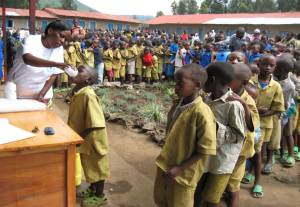SCI needs to expand coverage to help treat 100 million children a year against bilharzia (schistosomiasis) and worms.
By Professor Alan Fenwick OBE, Director of SCI (Schistosomiasis Control Initiative), Imperial College, London)

Schistosomiasis is a type of infection caused by parasites that live in fresh water, such as rivers or lakes, in subtropical and tropical regions worldwide. It is also known as bilharzia.
The Schistosomiasis Control Initiative (SCI) at Imperial College London supports Ministries of Health and Education in 16 countries to deliver medicines to treat people infected with schistosomiasis and three intestinal worms. The medicines are donated by various pharmaceutical companies, Merck KgGA (praziquantel), GSK (albendazle) and Johnson and Johnson (mebendazole), and for the most part, the targets are school aged children.

The SCI’s role includes advocacy at all levels in the countries from Ministers down through regional officials to teachers and health staff who deliver the medicines. These medicines are safe to swallow and effective. For the most part they are delivered annually through schools or through communities. We assist the countries with mapping so that the geographical distribution of the diseases is known, and then with preparing medicine donation requests. (more…)

